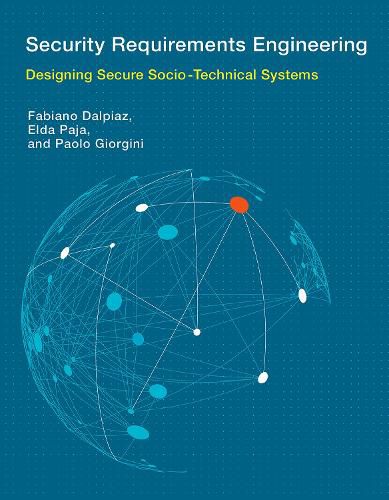Readings Newsletter
Become a Readings Member to make your shopping experience even easier.
Sign in or sign up for free!
You’re not far away from qualifying for FREE standard shipping within Australia
You’ve qualified for FREE standard shipping within Australia
The cart is loading…






A novel, model-driven approach to security requirements engineering that focuses on socio-technical systems rather than merely technical systems.Security requirements engineering is especially challenging because designers must consider not just the software under design but also interactions among people, organizations, hardware, and software. Taking this broader perspective means designing a secure socio-technical system rather than a merely technical system. This book presents a novel, model-driven approach to designing secure socio-technical systems. It introduces the Socio-Technical Modeling Language (STS-ML) and presents a freely available software tool, STS-Tool, that supports this design approach through graphical modeling, automated reasoning capabilities to verify the models constructed, and the automatic derivation of security requirements documents. After an introduction to security requirements engineering and an overview of computer and information security, the book presents the STS-ML modeling language, introducing the modeling concepts used, explaining how to use STS-ML within the STS method for security requirements, and providing guidelines for the creation of models. The book then puts the STS approach into practice, introducing the STS-Tool and presenting two case studies from industry- an online collaborative platform and an e-Government system. Finally, the book considers other methods that can be used in conjunction with the STS method or that constitute an alternative to it. The book is suitable for course use or as a reference for practitioners. Exercises, review questions, and problems appear at the end of each chapter.
$9.00 standard shipping within Australia
FREE standard shipping within Australia for orders over $100.00
Express & International shipping calculated at checkout
Stock availability can be subject to change without notice. We recommend calling the shop or contacting our online team to check availability of low stock items. Please see our Shopping Online page for more details.
A novel, model-driven approach to security requirements engineering that focuses on socio-technical systems rather than merely technical systems.Security requirements engineering is especially challenging because designers must consider not just the software under design but also interactions among people, organizations, hardware, and software. Taking this broader perspective means designing a secure socio-technical system rather than a merely technical system. This book presents a novel, model-driven approach to designing secure socio-technical systems. It introduces the Socio-Technical Modeling Language (STS-ML) and presents a freely available software tool, STS-Tool, that supports this design approach through graphical modeling, automated reasoning capabilities to verify the models constructed, and the automatic derivation of security requirements documents. After an introduction to security requirements engineering and an overview of computer and information security, the book presents the STS-ML modeling language, introducing the modeling concepts used, explaining how to use STS-ML within the STS method for security requirements, and providing guidelines for the creation of models. The book then puts the STS approach into practice, introducing the STS-Tool and presenting two case studies from industry- an online collaborative platform and an e-Government system. Finally, the book considers other methods that can be used in conjunction with the STS method or that constitute an alternative to it. The book is suitable for course use or as a reference for practitioners. Exercises, review questions, and problems appear at the end of each chapter.